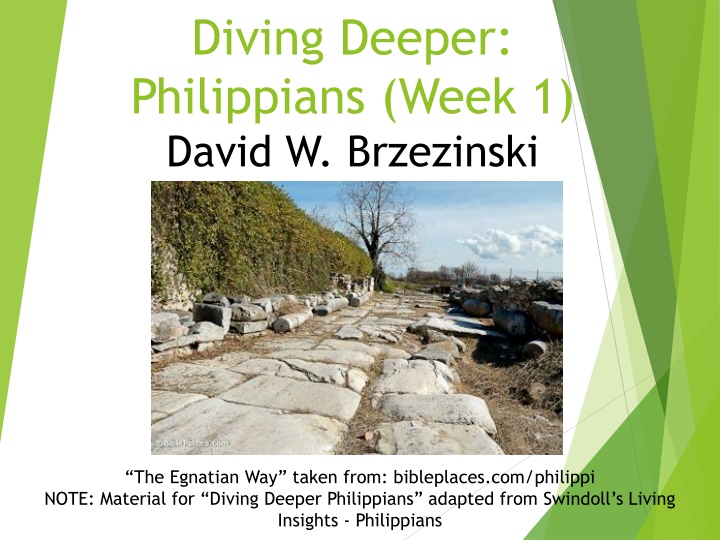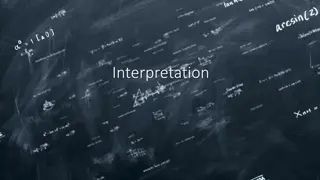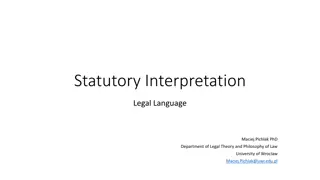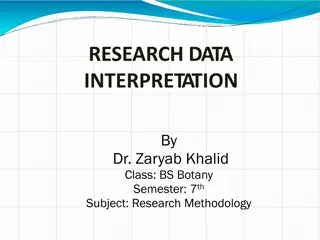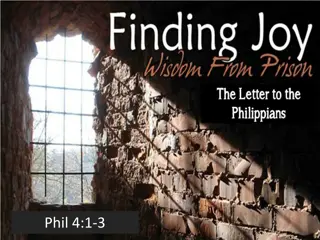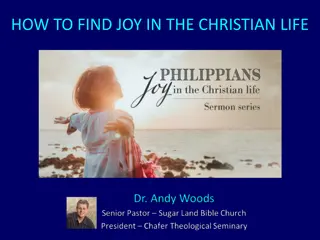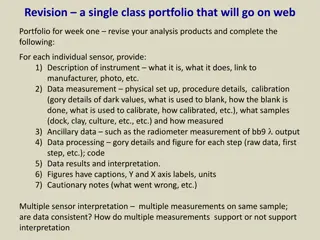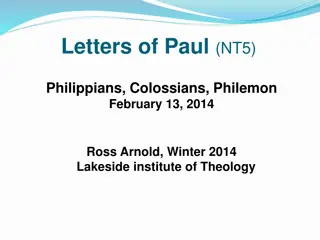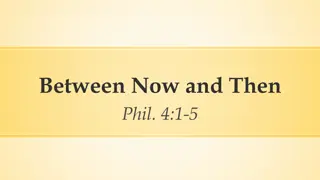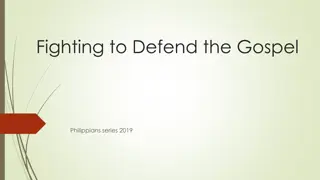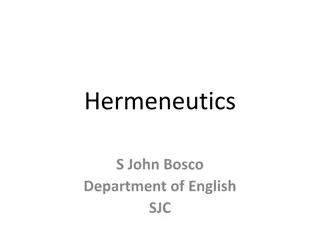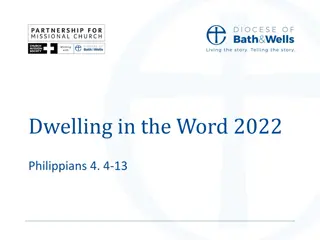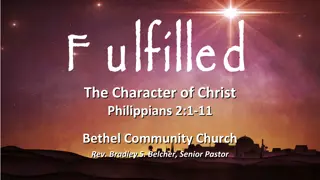Philippians: Interpretation Principles
In this series, delve into the book of Philippians with a focus on interpretation principles using the grammatical-historical method. Understand the human and divine elements of the Bible, as well as how to apply scripture to daily life through hermeneutics.
Download Presentation

Please find below an Image/Link to download the presentation.
The content on the website is provided AS IS for your information and personal use only. It may not be sold, licensed, or shared on other websites without obtaining consent from the author.If you encounter any issues during the download, it is possible that the publisher has removed the file from their server.
You are allowed to download the files provided on this website for personal or commercial use, subject to the condition that they are used lawfully. All files are the property of their respective owners.
The content on the website is provided AS IS for your information and personal use only. It may not be sold, licensed, or shared on other websites without obtaining consent from the author.
E N D
Presentation Transcript
Diving Deeper: Philippians (Week 1) David W. Brzezinski The Egnatian Way taken from: bibleplaces.com/philippi NOTE: Material for Diving Deeper Philippians adapted from Swindoll s Living Insights - Philippians
Scope Of This Series Introduction To Philippians Philippians Chapter 1 Philippians Chapter 2 Philippians Chapter 3 Philippians Chapter 4
Studying The Bible - Interpretation As Christians, we have developed specific principles to use when we interpret Scripture. Whenever we approach the Bible we are interpreting (directly and/or indirectly)! GOAL: Find the plain meaning of the text! Note: Usually a unique interpretation is an incorrect interpretation! Take time to study Philippians in the coming weeks. Bible study does take some time and effort, but the reward is priceless.
Interpretation - Review The Bible is both human and divine. Inspired by God: God s Word is for all people in all places at all times. (2 Timothy 3:16-17) theopneustos - God breathed Written by man: For a particular group of people at a particular time. historical particularity; conditioned by language, time, and culture (2 Peter 1:20- 21) pheros moved
Grammatical Historical Method When we interpret the Bible, we use what is called the grammatical-historical method. This method seeks to find the plain sense meaning of a Bible passage by determining what the text says grammatically and what it means historically Arnold and Beyer
Grammatical Historical Method Principles Principle #1: A passage must always first mean to us what it meant to the original audience. Principle #2: Understand the literary context of the passage. What is the author trying to say? Principle #3: Understand the historical context of the passage (the setting in which author and audience live) as well as the occasion and purpose of the writing (why was it written?). Principle #4:Understand a passage s genre and any figurative language it uses. Principle #5: Let Scripture interpret Scripture.
Grammatical Historical Method Hermeneutics Allow the Holy Spirit to apply the Scripture passage to my life. What does the Bible mean to me here and now? The start is always with good exegesis! A text must first and foremost mean to us what it originally meant to its original audience. The Holy Spirit will help us apply the text to our lives.
Study It / Think About It Pause To Discuss Think: Philippians is all about joy. Respond: What does joy mean to you? How would you define joy to a friend?
Philippians- Introduction The key lesson to be taken from Philippians is that Christians can have genuine joy. Contentment and peace (instead of the world s understanding of joy which many times equates to happiness ) Christ is truly revealed in the life of believers when believers experience/manifest joy The joy is something the world cannot truly experience until they enter a personal relationship with Christ
Philippians- Background Paul had been in prison and/or house arrest on multiple occasions (e.g. Acts 16:22-25 where he is singing for joy in the prison on Philippi!; Acts 28:30-31) While under house arrest in Rome (Acts 28) Paul is still teaching and writing. It is during this time that Paul writes the Prison Epistles . Ephesians Theological circular letter meant for Asia Minor Philippians Encouraging letter to a specific church in Macedonia Colossians Theological letter to a specific church in Asia Minor regarding false teachers Philemon Specific letter to a leader in the church at Colossae in Asia Minor regarding Onesimus
Philippians- Uniqueness No problem passages for scholars. No Old Testament quotations. Likely the audience was primarily gentile with few, if any, Jewish members The words joy and/or rejoice can be found in each chapter and are present at least a dozen times throughout the text. Jesus Christ is mentioned over forty times exemplifying how Christ and joy go together!
Philippians- Facts Who? Written by Paul (with Timothy) Philippians 1:1 Where? Rome where Paul was under house arrest Acts 28:16-31 When? A.D. 62 (approximately) as Paul awaited an audience before Caesar Acts 28:16-31 Why? To encourage believers at the church in Philippi to experience and live out the joy of Christ via the power of the Holy Spirit. Unlike other letters, this was not intended for widespread circulation in the same way. Paul thanks believers for help and explains his joy in hardship.
Philippi- Facts Founded: 4th Century B.C. Region rich in gold and silver Named ultimately after Alexander the Great s father (in 356 A.D. by Philip II of Macedon) Philippian Church Plant: A.D. 49 with Egyptians, Romans, Greeks, and those from Thrace Paul, Silas, Timothy, and Luke founded the church during Paul s second missionary journey The first convert was Lydia (Acts 16:14-15) Paul was imprisoned during his visit and eventually forced to leave Located on the Egnatian Way, a major east-west highway Rich trading culture Many religions
Philippians- Egnatian Way https://carleton.ca/grs/2018/walking-the-via-egnatia-with-walter/ Egnatian Way: 700 miles long (30 day walk)
Philippians- Egnatian Way from AramcoWorld
Philippians - Chapter 1 True joy flows from a heart that trusts God and submits to His will. Characterized by: Confidence in God s control Confidence in God s purposes and plan -> God s glory Thankfulness for God s love and relationship
Philippians- Chapter 1 vv. 1-2 v.1 Paul calls himself a bondservant (Gk. doulos) The Greek term means one who serves another to the disregard of his own interests. v.2 Paul refers to overseers (Gk. episkopos) and deacons (Gk. diakonos) Overseers kept a watchful eye over those in their care (pastors, elders, teachers) by shepherding (Gk. poimaino) Deacons (from which we get out word minister ) served submissively with humility. Elsewhere Paul uses the term for those who are self-sacrificing servants for the Kingdom. In Ephesians 4:12 Paul notes that such leaders were tasked with equipping the saints for service and building up the body of Christ. Cf. 1 Timothy 3 and Titus 1
Philippi- Chapter 1 vv. 3-8 Paul follows his greeting with joyous thankfulness and prayer (vv. 3-4) Paul s joy and thankfulness is rooted in the commitment to and proclamation of the Gospel found in the Philippians. The perseverance of the Philippians (past) and zeal for Christ (present) led Paul to acknowledge his confidence in their future faithfulness. In v. 6 the NASB records He who began a good work in you will perfect it until the day of Christ Jesus. The perfect (Gk. epiteleo) refers to the bringing about a planned result. God would do this for them as He always finishes what he begins. Don t be discouraged! God s got it! Paul refers to them all repeatedly (vv. 1,3,4,7, and 8) because of their collective commitment to Paul and the Gospel ministry.
Philippi- Chapter 1 vv. 9-11 Paul prays for specific things for the Philippians that can only come from God. Words for prayer in Philippians 1 Gk. proseuche general address to God (v.9) Gk. deesis specific requests of God (v. 4 and 19) Paul s two specific prayers: 1.) Paul prayed that the Philippian s love would grow and demonstrate real knowledge and discernment. Love based not on feelings but on Christ s work. The heart and the mind both grow! Cf. Hebrews 5:14 This love attends to the best interests of others. It affirms the excellent. It recognizes and deals with evil. This love will keep believers strong in Christ until His return ( the Day of Christ ). 2.) Paul prayed that the Philippians would be filled with the fruit of righteousness. Cf. Galatians 5:22-23 This is possible via the Holy Spirit and brings God glory (not us!!!)
Study It / Think About It Pause To Discuss Think: Prayer is so important! Respond: How can we be continually praying for others and how can we encourage them with the knowledge of our prayers?
Philippi- Chapter 1 vv. 12-14 - Confident Viktor Frankl (holocaust survivor): Everything can be taken from a man but one thing: the last of the human freedoms to choose one s attitude in any given set of circumstances (Mans Search For Meaning, 1984) Joy = Calm, Peace, Positive Attitude, Content which depend on the renewal of the mind by the Holy Spirit (Romans 12:2) and by focusing on spiritual things and the things of God (Philippians 4:8) Paul writes that the Gospel was spread because of his circumstances (and in ways it likely would not have spread otherwise). No! Why did this happen? Yes! How has God used this for His benefit? Paul s attitude encouraged those who heard about his plight. Cf. Joseph s words in Genesis 50:20 you meant evil against me, but God meant it for good
Philippi- Chapter 1 vv. 15-18 - Joyful Many were faithful to Christ and to Paul during his imprisonment (e.g. Timothy, Luke, and Mark) Paul s unjust imprisonment encouraged many to preach and teach Truth Paul s unjust imprisonment led glory-seekers to preach and teach Truth for their own good (not God s) Paul says that regardless, God s Word is being preached!!! God s Word will be spread via the Holy Spirt no matter the circumstances!
Philippi- Chapter 1 vv. 19-20 - Hopeful Paul demonstrated hopefulness in spite of his circumstances. He recognized the power of the prayerful Philippians (and others) as well as the Holy Spirit s power. Paul knew that he would be delivered one way or another (in this world or into the next). Ultimately, he desired that Christ would be exalted. Three Key Practical Points: 1. If Christ is the center of our lives, our focus will be on him and our attitude regarding circumstances will change. 2. If Christ is the center of our lives, we will not care about how others see us (but instead care about how God sees us). 3. If Christ is the center of our lives, He will help calm our fears about the future (as well as our anxiety, depression, etc.). Anxiety is the opposite of peace.
Study It / Think About It Pause To Discuss Think: Consider the previous slide: 1. If Christ is the center of our lives, our focus will be on him and our attitude regarding circumstances will change. 2. If Christ is the center of our lives, we will not care about how others see us (but instead care about how God sees us). 3. If Christ is the center of our lives, He will help calm our fears about the future (as well as our anxiety, depression, etc.). Respond: Which of these is most difficult for you?
Philippi- Chapter 1 vv. 21-26 The context for these verses is that Paul s whole life is centered in and on Christ. Paul was facing a hearing before Caesar (Nero) which could end in his death. (NOTE: In actuality, Paul was likely beheaded five years later after being imprisoned in a Mamertine prison under different circumstances [2 Timothy 4:16]). Paul was under human control (house arrest) Paul was under Divine control (God s sovereign plan) Paul uses synkrisis (Gk.) as a rhetorical device: this-or-that; compare-contrast There is a twist on this common ancient device that hope in Christ resolves the dilemma immediately (there are positives to both and the human dilemma of life and death is resolved). Ultimately, the best path is for Paul to remain for the sake of the Philippians (v. 25). This would bring them progress and joy. It seems that perhaps the Holy Spirit had revealed to Paul that he would be released and would not suffer death during his present ordeal (v.26)
Philippi- Chapter 1 vv. 27-30 Paul taught that regardless of his outcome, every believer s responsibility is the same in that they ought to live as Kingdom citizens (and not of this world). 1.) Live in unity and harmony (v. 27) 2.) Fight/struggle together (v. 27) the Greek here is synathleo (battle like soldiers and gladiators) 3.) Respond to opponents like Christ would (with confidence and joy) (v. 28) Believers know they are on God s path when opposition to their Gospel message arises. F.F. Bruce writes: it is a token of salvation to them, as it is a token of perdition for their opponents Swindoll writes that believers gain a new heavenly perspective for continuing their earthly walk.
Study It / Think About It Pause To Discuss Think: Paul tells us that we are to live as citizens of heaven and not as citizens of this world. Respond: How does that look for us practically?
